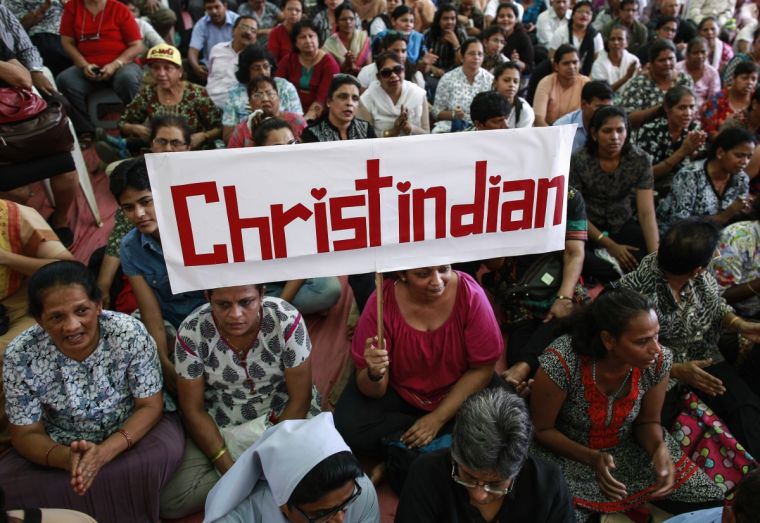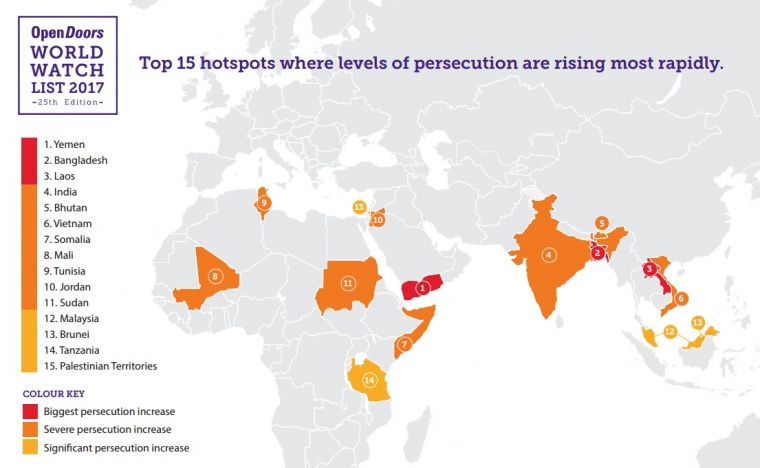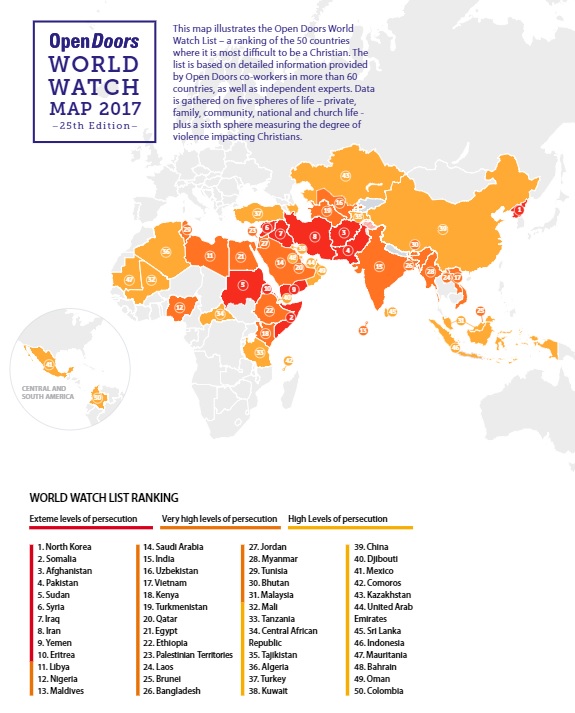North Korea Heads Surge In Christian Persecution Worldwide, Dramatic Rise In India

Christian persecution is rising rapidly across Asia, with a dramatic increase in India and surrounding countries, according to Open Doors.
India, Yemen, Bangladesh and Laos have witnessed the biggest rises in Christian persection, the persecution charity's latest World Watch List reveals.
North Korea tops the list again, as it has for the past 15 years.
One of the most common causes of persecution is the growing numbers of attacks by extremists.
CASE STUDY: The Nigerian pastor whose church was burned down by Boko Haram.
The list documents the 50 worst countries in which to live as a Christian. The report will be discussed at the House of Commons at a cross-party launch hosted by Rt Hon Theresa Villiers MP.
"This year there is a clear pattern of rising religious intolerance across the Indian sub-continent which affects many millions of Christians," said Lisa Pearce, CEO of Open Doors UK & Ireland.
"Religious nationalists attempt to forcibly convert people to the dominant faith of their nation, often turning to violence when community discrimination and non-violent oppression do not succeed in imposing their religious beliefs on minority Christians. These Christians are often from the lower castes, such as the Dalits in India who face huge socio-economic problems – they are an easy target for extreme nationalists."

India has risen to number 15 on the World Watch List, up from a ranking of 31 in 2013. According to Open Doors, more than 15 violent attacks against Christians in the country have been documented every week, and the true figure is expected to be even higher.
The surrounding countries of Pakistan, Bangladesh, Bhutan, Sri Lanka and Afghanistan have all also seen a rise in persecution this year.
Other countries of particular concern indicated by Open Doors include Somalia, where the charity says persecution levels are almost as high as in North Korea.
"If a Christian is discovered in Somalia, they are unlikely to live to see another day. Just the suspicion that someone is a Christian can lead to a rushed beheading," said Pearce.
More Christians are killed for their faith in Africa than anywhere else in the world and Mali, Mauritania and Sudan have all seen a dramatic rise in persecution.
"These unstable areas allow intolerance and persecution to flourish, resulting in large areas where people do not dare to profess their Christian faith," said Open Doors.

The charity highlighted the attempted eradication of Christianity by extremists as one of the most common forms of religious persecution.
"This is widely seen in northern Nigeria, Syria and Iraq where, after people have been driven out, homes have been ransacked, churches destroyed and village water sources poisoned," a statement from Open Doors said.
"In Nigeria, cattle are deliberately stolen and crops burned to make returning all but impossible unless significant aid and investment is pumped into the area of need. In addition, frequent so called 'lone-wolf' attacks by extremists make those equipped to effect change and rebuild fearful for their safety and the safety of their families."
Syria (5 in 2016 to 6 in 2017) and Iraq (2 in 2016 to 7 in 2017) have each seen a drop in the rankings. Open Doors said this is because many Christians in these countries have fled the region as a result of intense persecution by Islamic State.
"However, the high points score reflects that the situation is still dire for Christian," the charity said. "Aleppo [in Syria] was home to 400,000 Christians at the start of the civil war – now Open Doors estimates that less than 60,000 Christians remain with families still leaving every day. The few Christians who stay are largely in Christian enclaves; outside these areas they are targets for radical extremists.
"In Iraq, Christians are preparing to return to villages that have been liberated if and when it becomes safe for them to do so. Working parties are planning to rebuild once the damage and danger is assessed in areas like the Nineveh plains."
Pearce said the situation was very complex and lots of Christians from Iraq have indicated they are afraid to return home even once it is considered safe to do so.











